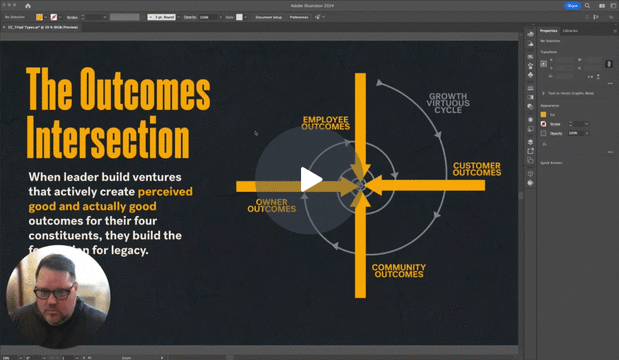
FWD Edition 96
We tend to work in institutions big on legacy: wealth managers, community organizations, colleges, and those who serve the above. Our clients are big on leaving something in the world that lasts, and so it should come as no surprise that recently I've had legacy on the brain.
I'm also very, very middle aged and so, with that comes—gestures wildly about—thoughts about what we leave in the world and whether it matters.
In this week's FWD, I'm taking us down the legacy rabbit hole, asking a very straightforward question:
Is legacy all it's cracked up to be?

YES to caring about outcomes
The first rule of building things that last is you have to care about outcomes. Outcomes for everybody. The post-Friedman economic model where the only people's outcomes who matter are investors and shareholders creates a craven world full of bad incentives... also known as Silicon Valley.
But when working with a client the first thing we want to explore, even before we talk to you is, "Do you have a clear sense of the Outcomes Intersection?"

Aligned benefits for owners, employees, customers, and the community around the business creates a virtuous cycle where the good of one speeds value to the good of the next. Break the virtuous cycle, and value pools and goes rancid at one of the four groups.

NO to building the legacy while flying it
This week I listened to a fantastic analysis of the music industry and how the biggest names are doing something their predecessors never considered: crafting their legacy while still in the game. Rather than managing the creative output of the music, they are aggressively and often quite skillfully managing the real-time narrative in an attempt to control what the world remembers about them.
The podcast—I think rightfully—calls out the self-pleasuring nature of this kind of narrative building. And it's easy to spot with artists. But in areas of commerce less public, we often miss this destructive practice.
Leaders have to focus firmly on the work that is in front of them and speeding value to the constituents they have today. Your ability to manage the narrative about your business while it's happening is an expensive and futile affair.

MAYBE PR is the answer?
Prior to working with us, many of our clients have assumed the answer to this narrative building is PR. First, we are pro excellent PR. We've seen it done really well, and seen it serve our clients well when handled appropriately.
But that phrase "when it's done well" is doing a lot of work in the previous sentence because most of the time it's not.

Leaders wrongly look to PR to convince the media to provide what is functionally free advertising for their business. Gentle reminder that every media organization is broke and bleeding money. They will not ship your self-congratulatory story unless there's something in it for them.
In tight-knit industries like wealth, PR is often a game of insiders where a handful of players are deemed newsworthy simply by existing and everyone will write about them positively for fear of being seen as too contrarian. The insular nature of these kinds of publications make them pretty useless for narrative building because mostly what they are doing is shipping the status quo and hoping theirs is the link you click on.

SERIOUSLY don't take yourself so damn seriously
In a turn of events that should surprise no one, Sam Altman of (he's in, he's out, there's a coup!, he's back, he's a saint, he's the devil) OpenAI fame continues apace in his Anakin style turn to the dark side.

This month (at Davos of all predictable places) he announced that OpenAI's work was so mission critical for the human race (here's a tip: don't borrow from Elon Musk's script), that people should stop writing about him and start getting in line to serve his world-saving endeavors.
I shouldn't have to say this is distasteful... but "This is distasteful."
We've seen the Without Us, Everyone is F**ked Show before. Previously starring such warm fuzzies as Elon, Zuck, even Bill Gates himself.
As much as it may seem the fast track to building a legacy, overplaying the importance of your work is a loser's game.
- Get radically clear about who you help and how
- Add 10% for optimism.
- Employ a skilled storyteller who can convert that tactical reality into narrative.
- Emily a skilled strategist who can turn story into a repeatable, trustworthy operation.
- Say NO to everything else, including self-aggrandizing world changing bits.

NOW what about legacy?
To steal the infamous words from Hamilton: a legacy is planting seeds in a garden we'll never see. As a very amateur gardener, I think about this often. Even when you are going to see the seeds grow, you're often very, very wrong about the outcome you're going to get.
Planting seeds is the business of hope. Now imagine that hope is founded in a world that you will shape, but won't see. That's legacy.
If you keep trying to "make a legacy" today, you're going to be futzing with those seeds, overwatering them, digging them up to see if they're rooting, Inviting all kinds of pestilence in.
Today we make value. 100,000 tomorrows from now, someone decides if that value told a story worth telling. That's the risk. That's the adventure.
Let's go.
Trying out some video training
So after much feedback I'm giving video a go again. For this week, here's a quick deep dive on the Outcomes Intersection and how to leverage it for growth. I'll talk about what it means for:
- Hiring
- Capital Raises
- Marketing Message
- and Service Design
Outcomes Intersection: Building a Foundation for Legacy - Watch Video

1. We eliminate the waste that's keeping value from getting to your prospects, saving you time, money, and attention.
2. We find the truth inside an organization to make it obvious outside.
3. We bring you the right team for the right work and break the "everybody needs a rebrand" trend.
4. We match ideas with operations. Helping you build a business that can deliver on your positioning and messaging is as important as getting the messaging right.
Stay brains on, heart open, forward progress.
